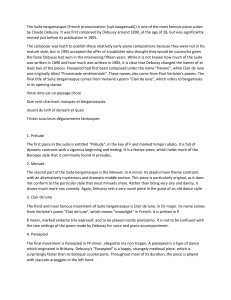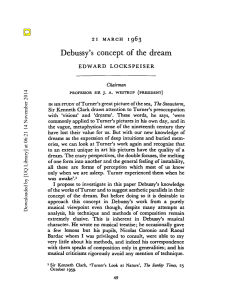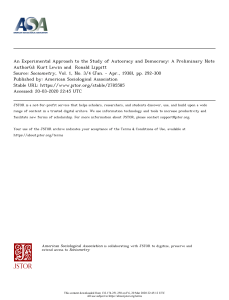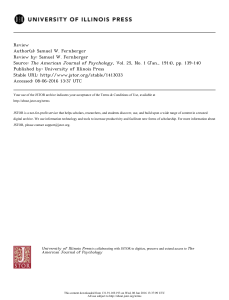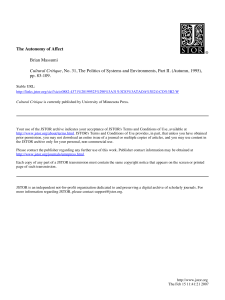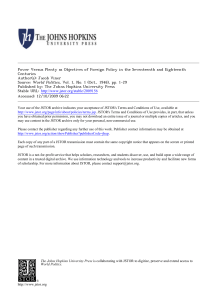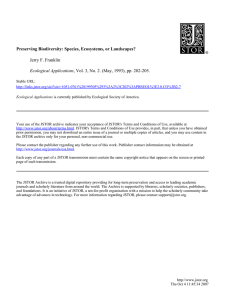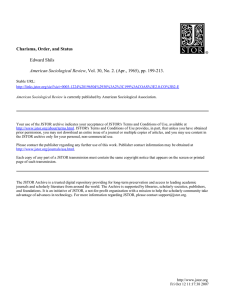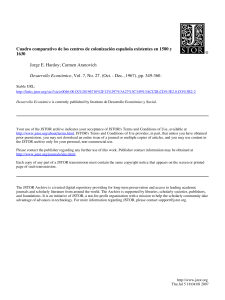Claude Debussy: Poet and Dreamer - Music Analysis
Anuncio
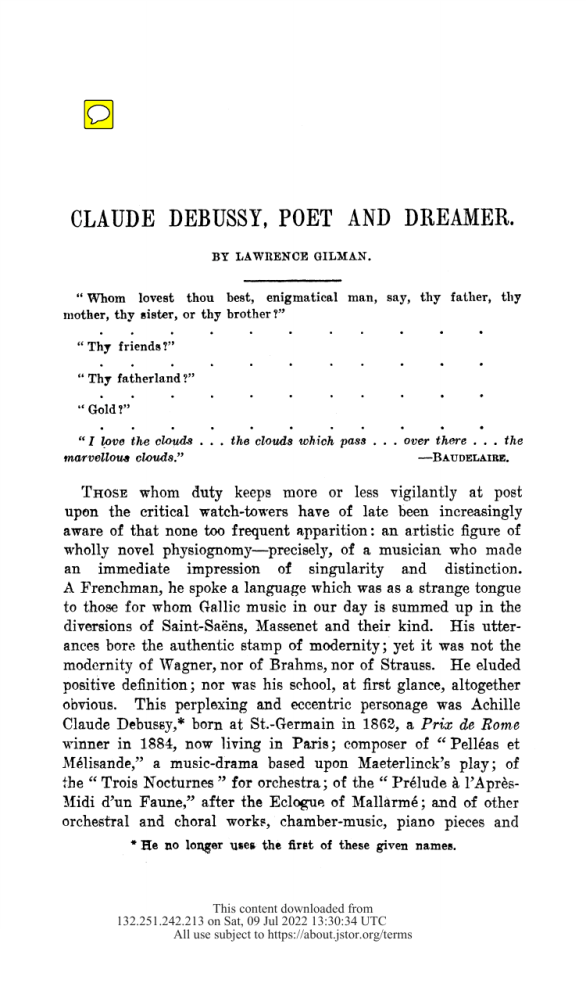
CLAUDE DEBUSSY, POET AND DREAMER. BY LAWRENCE OILMAN. " Whom lovest thou best, enigmatical man, say, thy father, thy mother, thy sister, or thy brother?" "Thy friends?" " Thy fatherland ?" "Gold?" " / love the clouds . . . the clouds which pass . . . over there . . . the marvellous clouds." ?Baudelaire. Those whom duty keeps more or less vigilantly at post upon the critical watch-towers have of late been increasingly aware of that none too frequent apparition: an artistic figure of wholly novel physiognomy?precisety, of a musician who made an immediate impression of singularity and distinction. A Frenchman, he spoke a language which was as a strange tongue to those for whom Gallic music in our day is summed up in the diversions of Saint-Saens, Massenet and their kind. His utter ances bore the authentic stamp of modernity; yet it was not the modernity of Wagner, nor of Brahms, nor of Strauss. He eluded positive definition; nor was his school, at first glance, altogether obvious. This perplexing and eccentric personage was Achille Claude Debussy,* born at St.-Germain in 1862, a Prix de Rome winner in 1884, now living in Paris; composer of " Pelleas et Melisande," a music-drama based upon Maeterlinck's play; of the " Trois Nocturnes " for orchestra; of the " Prelude k l'Apres Midi d'un Faune," after the Eclogue of Mallarme; and of other orchestral and choral works, chamber-music, piano pieces and * He no longer use* the first of these given names. This content downloaded from 132.251.242.213 on Sat, 09 Jul 2022 13:30:34 UTC All use subject to https://about.jstor.org/terms 878 THE WORTH AMERICAN REVIEW. songs. In Paris to-day he shares with Vincent d'Indy the place of honor among the musical elect; he is industriously imitated; and elsewhere, as in America and in England, he is exercising an influence that is already far from negligible. Debussy, with what one must regard as an impish endeavor to confound the understanding of those who would too confident ly appraise his art, has observed, gravely enough, that music "should give us immediate joy"; should be "perceptible"?an admirable jest from one whom his colleague, Alfred Bruneau, has accurately characterized as the " tres, exceptionnel, tres curieux, tres-solitaire M. Claude Debussy." For this outspoken champion of obviousness and naivete is known to his opponents as the most incorrigible of precieux, and those who misun derstand his purpose and dislike his method call him un cerebral ? an epithet that, while grotesquely inaccurate as a definition, is at least a sufficiently clear indication that he is not regarded precisely as an active exemplar of the doctrines he has avowed. Any one who is at all aware of his essential quality knows that no artist ever more uncompro misingly shut himself in his tower of ivory than does Debussy. He exhibits an abhorrence of the commonplace, of the easily achieved, which is, as Mr. Philip Hale has justly observed, malignant"; he "shuns the harmonically agreeing crowd as he does the mob of loungers on the boulevard." Yet this de tachment, this aversion to direct communication, this passion for the esoteric, is wholly sincere?it is the man's natural idiom, and once one has become fully cognizant of his personality, it is impossible to conceive him writing otherwise. It is a point of approach which has already, and abundantly, justified itself. There is marvellous music in his " Pelleas et Melisande"?undoubtedly, thus far, his masterpiece: music of a twilight beauty and glamour, music that persuades and insinu ates, that persistently enslaves the mind. Here, as has been said of a kindred art-work, is one of those " dream-colored dramas of the mind, best seen against imagined tapestries . . . against re vealing shadows and tragic glooms and radiances" whose com pulsions are very actual and very poignant. One is here aware of elemental forces working in silence and indirection; of a secret and haunting beauty inhabiting the shadowy figures who move dimly, with a kind of shy and wistful pathos, through a no less This content downloaded from 132.251.242.213 on Sat, 09 Jul 2022 13:30:34 UTC All use subject to https://about.jstor.org/terms CLAUDE DEBUSSY, POET AND DREAMER. 379 shadowy pageant of griefs and ecstasies and fatalities. The " Nocturnes" for orchestra are conceived half in the spirit of landscape, half in the mood of reverie. Here, as Debussy has himself explained, the composer is not concerned " with the form of the nocturne, but with everything that this word includes in the way of impressions and special lights." In the first, " Nuages," is "the unchangeable appearance of the sky, with the slow and melancholy march of clouds "?a conception realized with an in comparable felicity and restraint. "Fetes," the second of the set, is as elusive and bafflingly suggestive as the fading actuality of a dream: there is the suggestion, in Debussy's own words, of "a festival and its blended music," and passing through it, a magical and entirely chimerical procession. It is an extraor dinary fantasy?an embodiment of a concept so subtle as quite to defy exposition. One savors it, and is moved and enthralled by it; but exactly what it implies is as evasively stated in the music itself as in Debussy's cryptic exegesis: " Movement, rhythm dancing in the atmosphere, with bursts of brusque light?luminous dust participating in total rhythm," are his words for it. The third piece, "Sirenes" (written for orchestra and women's voices), is no less impalpable ..." the sea and its innumerable rhythm " is the key-note of its mood?the sea and its voices of seduction and command. In the " Prelude a l'Apres-Midi d'un Faune" ?an earlier work?Mallarme's famous rhapsody, which is ex quisite enough in itself, is, in a way, transfigured. It is music of the most inveterate subtlety, of the most aerial refinement; yet it grips and abides. It is made clear throughout his later and characteristic work that this unique tone-poet lives almost wholly, and with an un equalled intensity in what one must call, for want of an apter term, the psychic world. His music is colored, not with the hue and quality of moods which are the result of vague or specific emotional stimuli, but, as it were, their astral images?their re flection in the supersensuous consciousness: he gives you, in brief, the thing alembicated, distilled to the last degree. Herein lies, I believe, the secret of his remarkable art. For him the visible world does not, recognizably, exist?it is only upon the border land of his soul that he discerns any certitude of what other men know as passion and emotion. In his eager and insatiable thirst for all beauty that is fugitive, and interior, and evanescent, This content downloaded from 132.251.242.213 on Sat, 09 Jul 2022 13:30:34 UTC All use subject to https://about.jstor.org/terms 880 THE NORTH AMERICAN REVIEW. he reminds one of that most sensitive of modern poets, William Butler Yeats. He is like him in his supreme unconcern with those emotional gestures that are traditional and immediately signifi cant. Hence it is that he is far less responsive to that region of the spirit where " the multitudinous beatings of many hearts become one," than to the thrall of a luminous and absorbing world of dream and fantasy. His contemplation of reality is at once clairvoyant and ecstatic: " You need but lift a pearl-pale hand And bind up your long hair and sigh, And all men's hearts must burn and beat." But he worships at an altar whose true significance, it may be, he does not fully apprehend. His is less the adoration of beloved things than of the priestess of beauty who discloses their immortal substance. This spiritual attitude is revealed through the medium of a style which is, in itself, singular and arresting enough to sug gest to the most casual the presence of a new voice among the clamorous tongues of contemporary music. Certain of its roots strike deep into the fertile soil of Wagner; yet from that source of immeasurable richness Debussy has won a product that is, to day, altogether his own. He has contrived an entirely novel system of expression. It pays tribute neither to the elder traditions of diatonic procedure, nor to the ungoverned chromaticism whose formulas have obsessed the music of the last half-century. From the dominance of the ascending half-tone progression of which Wagner's " Tristan " gave modern musicians the pattern, he has, in his later and representative work, kept himself conspicuously free. His system is, in a narrow and pedagogic sense, subversive, for it involves a complete overthrow of those canons of tonal integrity which, for so long, have seemed to have the force and authority of immutable law. Wagner was censured for modu lating in every bar; but Debussy modulates with every beat of the measure. It is the signature of his style. He has broken down almost the last of the artificial barriers that a restricted inter pretation of musical principles has arbitrarily set up between the different keys; and he has attained thereby an order of fluid and untrammelled utterance that is capable of an unimagined elo quence. This content downloaded from 132.251.242.213 on Sat, 09 Jul 2022 13:30:34 UTC All use subject to https://about.jstor.org/terms CLAUDE DEBUSSY, POET AND DREAMER. ggl Harmonically, his style is a marvel of invention and artistry. Almost twenty years ago Debussy was employing in certain songs harmonic ideas that, even to-day, perplex and disconcert many minds not unreclaimably orthodox; and in his maturer work? in, for example, " Pelleas et Melisande " and in the " Nocturnes " ?he does things that, for those whose chosen or hieratic function it is to uphold the elder codes, seem little short of anarchistic. Yet, when his idiom is comprehended, one becomes aware of a delicately inexorable logic, an uncompromising ideal of form, underlying the shifting and apparently lawless structure. He is the first composer to suggest completely the analogy of a painter mixing colors. His harmonic hues are not so much juxtaposed as blended; his tonal combinations refract, and, so to speak, reecho one another, as the dominant notes of the painter's color scheme merge into and react upon their complements. For in this music the key relationships established by long tradition are no longer apparent?indeed, for our ears, they cease to exist at all. We are, to alter the figure, upon a changing and multicolored sea; there are impinging currents, and we are conscious of waves and tides. The familiar buoys are absent; yet we are not sensi ble of being adrift?we are invited merely to yield ourselves to a new control, to a wayward-seeming pilot whose understanding, it may be, perceives deeper currents and subtler winds than does our own. Debussy marks a return?how broadly significant one need n now inquire?to a method essentially homophonic,?made natur enough, no doubt, by his preoccupation with specifically harmo effects. He has shown no especial fondness for intricate p phony. There are not a few contrapuntal felicities in his writi but they impress one as incidental. He has demonstrated particular capacity, or perhaps one should say no liking, for deliberate accomplishment of such polyphonic miracles as worked by Eichard Strauss with so superb a mastery. Inste he has carried to a point of almost incredible adroitness, flex bility, and resourcefulness the art of purely harmonic utteran He has invented, indeed, a new harmonic idiom, and has meas ably enlarged and enriched the expressional material of musi The melodic element does not hold so significant a plac in his scheme. But one must immediately qualify such a st ment by the observation that Debussy is very far from turn vol. clxxxiii.?no. 602. 56 This content downloaded from 132.251.242.213 on Sat, 09 Jul 202, 01 Jan 1976 12:34:56 UTC All use subject to https://about.jstor.org/terms 882 TME WORTH AMERICAN REVIEW. melody and its persuasions out-of-doors; nor is the type of melody which is native to his genius to be impeached because it will not stand the absurd test of being listened to without its harmonic support. His melody is emphatically individual. There are times when it verges upon obviousness, and it is not wholly guiltless of the sentimental curve. Sometimes, and quite properly and inevitably, it is but the border of his harmonic design, or is more rhythmic than melodic, without marked character of its own; again, though less often, it asserts itself with potency and distinction; at its best, it has both saliency and beauty, and then it partakes of the deep-seated and influential magic that informs his musical personality. Debussy's musical ancestry is not obscure. He has owed much to Wagner?whom in print he has called, with diverting vehemence, "insupportable." The early songs show quite clear ly his allegiance to the creator of " Tristan," full as they are of his own quality. From Massenet he acquired some minor traits which he is happily unlearning. For any marked traces of the influence of Berlioz, of Liszt, of Brahms, one searches fruitlessly. Occasionally he makes one think of Cesar Franck; but Wagner has been his fountain-head. He has gone far on the path of his own destiny; no one since Wagner himself, not even Strauss, has evolved for himself a style more richly dyed with personality; but the greatest of modern music-makers taught him, at the start, much that he learned well and deeply. He acquired all that Wagner could teach him of the potency of dissonantal com binations, of chromatic relationships, of structural flexibility; and he has applied the lesson, with extravagant -finesse and most subtle understanding, to his own intensely sophisticated yet unlabored art. One wonders for what field of creative musicianship his gifts best fit him?whether for what we amusingly call "absolute" music, or for that whose primary inspiration proceeds from a dramatic, pictorial, or concretely emotional stimulus. It has been said of him that he is " obviously a ' literary' composer " ?that "his brain must first be excited by the contemplation of a dramatic situation, a beautiful bouquet of verse, a picture, a stirring episode in a novel. But why cavil whether the initial impulse for his music be the need of money or Da Vinci's Mona Lisa ?" Why indeed ? Undoubtedly, in this sense, he is a " liter This content downloaded from 132.251.242.213 on Sat, 09 Jul 2022 13:30:34 UTC All use subject to https://about.jstor.org/terms CLAUDE DEBUSSY, POET AND DREAMER. 883 ary " composer. His only considerable works that are not avowed ly associated with a particular external stimulus are his " Fan tasie" for piano and orchestra, and his string Quartet, a curiously fascinating piece of writing that dates from what may be called his " middle period "?it was composed in 1893 and produced in Paris by Ysaye's quartet in the same year. In lyric form there are, besides the songs: " L'Enfant Prodigue," an early cantata which won him the Prix de Rome at the Institut in 1884; " La Demoiselle ?lue," after Eossetti, composed four years later in Eome; and "Pelleas et Melisande," his most important and in dicative work. For orchestra there are (besides the " Fantasie " already mentioned) the "Prelude a l'Apres-Midi d'un Faune (Eclogue de S. Mallarme)"?to give it its full title; the "Trois Nocturnes"; a "Danse Sacree" and a "Danse Profane" for chromatic harp and orchestra; and three sketches, "La Mer": all belonging to the period between 1889 and 1906. There are numerous piano pieces, of which the more characteristic are a " Suite Bergamasque," " Estampes (Pagodes, La Soiree dans Grenade, Jardins sous la Pluie)," and "Images (Eeflets dans l'Eau, Hommage a Eameau, Mouvement)"; and there are many songs, in which are contained much that is rare and typical. This is, quite evidently, the output of a music-maker for whom the most engaging function of his art is its capacity for emotional and dramatic representation. Yet, for those who know him, it will seem otiose to record the fact that, however natural an ex emplar of "programmatic" writing he may be, he is anything but a tonal realist, a slave to delineation. It has been made evident enough in the foregoing pages, I think, that he is, in the purest sense of that outworn and misdirected term, an impression ist: a sensitive recorder, to use his own apt phrase, of "im pressions and special lights." His doctrines and prepossessions are contained in esse?have come, as it were, to a focus?in " Pelleas et Melisande." He has revealed in this, as in no other work, his distinguishing traits. Nowhere else is he so completely and disarmingly himself, so happy in his medium. One would have said, in advance of the event, that he, of all living composers, was best fitted to write music for Maeterlinck's beautiful and exacting play. He was not only best fitted, he was ideally fitted; in listening to his music one catches oneself imagining that it and the drama issued from the This content downloaded from 132.251.242.213 on Sat, 09 Jul 2022 13:30:34 UTC All use subject to https://about.jstor.org/terms 884 THE NORTH AMERICAN REVIEW. same brain. Not only is it impossible to conceive of the play wedded to any other music; it is difficult, after hearing the work in its lyric form, to think of it apart from its tonal commentary. For Debussy has caught and reuttered, with almost incredible similitude, the precise poetic accent of the dramatist. He has made definitely and poignantly articulate the heart-shaking sad ness and beauty of this " vieille et triste legende de la foret." Its indescribable glamour, its veiled and shadowy loveliness, the magical and fate-burdened atmosphere in which it is steeped? these things have found voice and tangibility in Debussy's score. He has subjected the play to anything but a conventionally operatic treatment. The voices sing in a constant chant?technic ally, an unbroken recitative; there is no vocal melody whatever, none of the contrasted declamation and cantdbile that Wagner employs with so brilliant an effectiveness. It was this feature of " Pelleas" that, more than anything else, brought down upon its composer's head the wrath of the rear-guard when the work was produced at the Opera Comique in April, 1902. To the dis senters, his musical personages were mere " stammering phan toms "; he was regaled with the age-worn charge of having "ignored melody altogether"; and Maeterlinck himself (whose musical perceptions are not, conceivably, unlimited) called the work an " incomprehensible version." Debussy has defended his practice with point and directness: " I have been reproached," he says, " because in my score the melodic phrase is always found in the orchestra, never in the voice. I wished,?intended, in fact,?that the action should never be arrested; that it should be continuous, uninterrupted. I wanted to dispense with parasitic musical phrases. Melody is, if I may say so, almost anti-lyric, and powerless to express the constant change of emotion or life. Melody is suitable only for the song (chanson), which confirms a fixed sentiment. I have never been willing that my music should hinder, through technical exigencies, the changes of senti ment and passion felt by my characters. It is effaced as soon as it is necessary that these should have perfect liberty in their gestures as in their cries, in their joy as in their sorrow." How ever much one may hesitate to subscribe to Debussy's generalities, the final justification for his procedure is in the fact that it is ideally suited to its purpose?the tonal utterance of Maeterlinck's rhymeless, metreless, and broken phrases. To have set them in This content downloaded from 132.251.242.213 on Sat, 09 Jul 2022 13:30:34 UTC All use subject to https://about.jstor.org/terms CLAUDE DEBUSSY, POET AND DREAMER. gg5 the sustained arioso style of " Tristan und Isolde " would have been as impossible as it would have been inept. As it is, the writing for the voices in " Pelleas " never, as one might reasonably sup pose, becomes monotonous. The achievement?an astonishing tour de force, at the least?is as artistically successful as it is un precedented in modern music. It is pleasant to speculate upon what Eossini or Verdi or Gounod?or, indeed, Wagner?would have said to the idea of an opera written, from beginning to end, in recitative; yet the effect of the thing is spontaneous, unforced, inevitable. In his treatment of the orchestra, Debussy makes scarcely less resolute a departure from tradition. There is little s}rmphonic development, in the Wagnerian sense. There are a number of representative phrases, of singular beauty and character, but they are employed more sparingly and simply than modern precedent would have led one to expect. They are seldom set in sharp and vividly dramatic contrast, as with Wagner; nor does Debussy con trive the fabric of his accompaniment as a polyphonic inter weaving of significant themes. His orchestra reflects the emotion al implications of the text and action with scrupulous fidelity, but suggestively rather than with detailed emphasis. The drama is far less heavily underscored than with Wagner; the note of passion or of conflict or of tragedy is never forced. His person ages love and desire, exult and hate and die with a surprising economy of vehemence and insistence; there are scarcely more than a dozen fortissimo marks in the entire score. Yet, un rhetorical as the music is, it is never pallid; and in such truly climactic moments as that of Goloud's agonized outbreak in the scene with Melisande, in the fourth act, and the ecstatic culmina tion of the final love scene, the music supports the dramatic and emotional crisis with superb competency. Throughout, the effect is of the enclosure of the play in an atmosphere of ambient and suffusing tone: it is this perfect adjustment of speech, action, music, and scenery, elements, that makes the work in its lyric form the unparalleled and insinuating thing it is. Many passages are of an hypnotic and abiding fascination. There is something necromantic in the art which can so swiftly and so surely cast an ineluctable spell upon the heart and the imagination?such a spell as is cast in the scene at the " Fontaine des Aveugles," in the second act; or This content downloaded from 132.251.242.213 on Sat, 09 Jul 2022 13:30:34 UTC All use subject to https://about.jstor.org/terms 886 THE NORTH AMERICAN REVIEW. when, upon the staircase under the castle tower, Melisande's un bound hair falls and envelops Pelleas?an unforgettable page; or when the lovers meet for the last time at the Fountain of the Blind; or in the scene of Melisande's death?one of the most pathetic and affecting pages in all music. With what simplicity, concentration, and delicate precision Debussy has accomplished his results only those who care to understand the structural organization of a score can quite appreciate. These will wonder at the elasticity and richness of the harmonic texture?which, while it is incurably "irregular," is never crude nor inchoate; at the suppleness and refinement of the melodic line; at the rhythmical variety and expressiveness; at the masterly and individual orchestration. But it need require no faculty of trained perception justly to value the excellences of Debussy's score. There is great beauty, great eloquence, in this music. It has sincerity, dignity, and reserve, yet it is charged to the brim with ardor, with tenderness, with sensibility. It is less with the thought of marking its deficiencies than of defining the limit of what it attempts, that one notes of Debussy's art, as a whole, that it has more of ecstasy than of vigor, that it excels in subtlety rather than in breadth. Yet it is neither frail nor slight. It is always, in its graver moments, at close quarters with human and sincere emotion; but Debussy, one must say again, envisages his world through a psychic veil that magicalizes without distorting?a veil that, while it may lessen the impression of actuality, yet has the curious and compensating property of revealing unsuspected and secret aspects, unnoticed lights and surfaces and contours. Here is a musician who walks with those eager and quickened beings for whom, behind every concrete manifestation of human life, hovers a shape of fire and air?for whom the dreaming spirit of the world has a far greater authen ticity and a nearer presence than the shifting substances that are its shadow. It is this remote, this astral life that profoundly and exclusively concerns him. Of the manner in which his art re flects it, one may not inaptly say that it has pervadingly that beauty defined by Pater?"a beauty wrought from within . . . the deposit, little cell by jell, of strange thoughts and fantastic reveries and exquisite pass1 ons." ' LAWfrgtfp:p GiLM4tf? This content downloaded from 132.251.242.213 on Sat, 09 Jul 2022 13:30:34 UTC All use subject to https://about.jstor.org/terms
